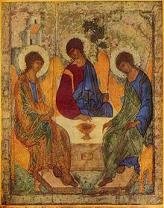 In the last issue I shared more about Arius, whose teachings were anathematized, in order that my readers might have an accurate idea of what drove the Fathers of the Church to develop the particular belief we hold about the person of Jesus. As much as Arius struggled to maintain the unique status of Jesus, he was still left with a creature, however exalted such a one may be. Can such a creature be worshipped? Can such a creature save humanity from the awful reality of sin? If not, if the Son indeed shares the same divine nature with the Father and the Spirit, how can the Church best think and speak of such a mysterious reality? The Of course one of our greatest Fathers of the Church, Athanasius, had a response to Arius and his position. Athanasius’ response to the Arian position is a deft mixture of biblical exegesis and theological insight. Athanasius insists that Arius’ explanationof the Son’s relationship to the Father is fundamentally flawed. Athanasius argues, that Arius has failed to think through the implications of his assertion that “the Son is from nothing” and “did not exist before He was begotten.” If Arius is correct, how could the Son rightly receive such names as “Son,” “God” and “Wisdom”? If these names do not pertain to the Son by nature, that is, because of what he essentially is, they must be attributed to him because he participates in something beyond himself. Exactly what?
In the last issue I shared more about Arius, whose teachings were anathematized, in order that my readers might have an accurate idea of what drove the Fathers of the Church to develop the particular belief we hold about the person of Jesus. As much as Arius struggled to maintain the unique status of Jesus, he was still left with a creature, however exalted such a one may be. Can such a creature be worshipped? Can such a creature save humanity from the awful reality of sin? If not, if the Son indeed shares the same divine nature with the Father and the Spirit, how can the Church best think and speak of such a mysterious reality? The Of course one of our greatest Fathers of the Church, Athanasius, had a response to Arius and his position. Athanasius’ response to the Arian position is a deft mixture of biblical exegesis and theological insight. Athanasius insists that Arius’ explanationof the Son’s relationship to the Father is fundamentally flawed. Athanasius argues, that Arius has failed to think through the implications of his assertion that “the Son is from nothing” and “did not exist before He was begotten.” If Arius is correct, how could the Son rightly receive such names as “Son,” “God” and “Wisdom”? If these names do not pertain to the Son by nature, that is, because of what he essentially is, they must be attributed to him because he participates in something beyond himself. Exactly what?
Perhaps, Arius suggests, such names can be attributed because of the Son’s “participation” in the Holy Spirit. That is, the Holy Spirit has communicated to the Son attributes the Son himself does not possess by nature. But does not this participation and communication reverse the order of giving and receiving that Jesus teaches in the Gospel of John? Jesus states that the Spirit “will glorify me, because he will take what is mine and declare it to you” (John 16:14). Yes, Athanasius insists, the Son does receive by participation, but this is an eternal, essential participation, one that characterizes the relationship between Father and Son alone. This is the only possibility. We see that the Fathers had a great difficulty in finding ways to present God as “Three-In-One”.
